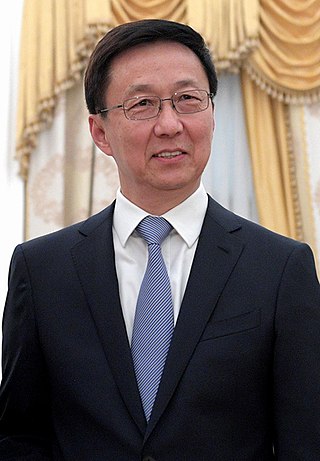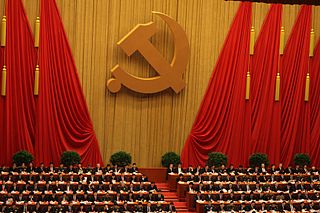In China, politics functions within a communist state framework based on the system of people's congress under the leadership of the Chinese Communist Party (CCP), with the National People's Congress (NPC) functioning as the highest organ of state power and only branch of government per the principle of unified power. The CCP leads state activities by holding two-thirds of the seats in the NPC, and these party members are, in accordance with democratic centralism, responsible for implementing the policies adopted by the CCP Central Committee and the National Congress. The NPC has unlimited state power bar the limitations it sets on itself. By controlling the NPC, the CCP has complete state power. China's two special administrative regions (SARs), Hong Kong and Macau, are nominally autonomous from this system.

The Politburo of the Chinese Communist Party, formally known as the Political Bureau of the Central Committee of the Communist Party of China, is the highest political body of the Central Committee of the Chinese Communist Party.

The Politburo Standing Committee (PSC), officially the Standing Committee of the Political Bureau of the Central Committee of the Communist Party of China, is a committee consisting of the top leadership of the Chinese Communist Party (CCP). Historically it has been composed of five to eleven members, and currently has seven members. Its officially mandated purpose is to conduct policy discussions and make decisions on major issues when the Politburo, a larger decision-making body, is not in session. According to the party's constitution, the General Secretary of the Central Committee must also be a member of the Politburo Standing Committee.

The General Secretary of the Central Committee of the Chinese Communist Party is the head of the Chinese Communist Party (CCP), the sole ruling party of the People's Republic of China (PRC). Since 1989, the CCP general secretary has been the paramount leader of the PRC.
The orders of precedence in China is the ranking of political leaders in China for the purposes of event protocol and to arrange the ordering of names in official news bulletins, both written and televised. It is also sometimes used to assess perceived level of political power. Although there is no formally published ranking, there is usually an established convention and protocol, and the relative positions of Chinese political figures can usually be deduced from the order in meetings and especially by the time and order in which figures are covered by the official media. Since 1982, the General Secretary of the Chinese Communist Party has been the highest-ranking official in the People's Republic of China (PRC).
Paramount leader is an informal term for the most important political figure in the People's Republic of China (PRC). The paramount leader typically controls the Chinese Communist Party (CCP) and the People's Liberation Army (PLA), often holding the titles of CCP General Secretary and Chairman of the Central Military Commission (CMC). The state representative (president) or head of government (premier) are not necessarily paramount leader—under China's party-state system, CCP roles are politically more important than state titles.
The Shanghai clique, also referred to as the Shanghai gang, Jiang clique, or Jiang faction, refers to an informal group of Chinese Communist Party (CCP) officials who rose to prominence under former CCP General Secretary Jiang Zemin while he served as the party chief and mayor of Shanghai.
Generations of Chinese leadership is a term historians use to characterize distinct periods of the leadership of the Chinese Communist Party (CCP) and, by extension, successive changes in the ideology of the CCP. Historians have studied various periods in the development of the government of the People's Republic of China (PRC) by reference to these "generations".

The Foreign Affairs Commission of the Central Committee of the Chinese Communist Party, commonly called the Central Foreign Affairs Commission, is a commission of the Central Committee of the Chinese Communist Party (CCP) that exercises general oversight on matters related to foreign affairs.

Han Zheng is a Chinese politician serving as the current vice president of the People's Republic of China since 2023. He previously served as the first vice premier of the People's Republic of China between 2018 and 2023, and as a member of the Politburo Standing Committee of the Chinese Communist Party (CCP) between 2017 and 2022.

The government of the People's Republic of China is based on a system of people's congress within the parameters of a unitary communist state, in which the ruling Chinese Communist Party (CCP) enacts its policies through people's congresses. This system is based on the principle of unified state power, in which the legislature, the National People's Congress (NPC), is constitutionally enshrined as "the highest state organ of power." As China's political system has no separation of powers, there is only one branch of government which is represented by the legislature. The CCP through the NPC enacts unified leadership, which requires that all state organs, from the Supreme People's Court to the President of the People's Republic of China, are elected by, answerable to, and have no separate powers than those granted to them by the NPC. By law, all elections at all levels must adhere to the leadership of the CCP. The CCP controls appointments in all state bodies through a two-thirds majority in the NPC. The remaining seats are held by nominally independent delegates and eight minor political parties, which are non-oppositional and support the CCP. All government bodies and state-owned enterprises have internal CCP committees that lead the decision-making in these institutions.
The 17th Politburo of the Chinese Communist Party (CCP), formally the Political Bureau of the 17th Central Committee of the Communist Party of China, was elected at the 1st Plenary Session of the 17th Central Committee of the CCP on 22 October 2007 in the aftermath of the 17th National Congress. This electoral term was preceded by the 16th Politburo and succeeded by the 18th. Of the 25 members, nine served in the 17th Politburo Standing Committee.

The 18th National Congress of the Chinese Communist Party was held November 8-15, 2012 at the Great Hall of the People. It was preceded by the 17th National Congress of the Chinese Communist Party. Due to term limits and age restrictions, seven of the nine members of the powerful Politburo Standing Committee (PSC) retired during the Congress, including Hu Jintao, who was replaced by Xi Jinping as General Secretary of the Chinese Communist Party. The Congress elected the 18th Central Committee of the Chinese Communist Party, and saw the number of Politburo Standing Committee seats reduced from nine to seven. It was succeeded by the 19th National Congress of the Chinese Communist Party.
The 18th Politburo of the Chinese Communist Party (CCP), formally the Political Bureau of the 18th Central Committee of the Communist Party of China, was elected at the 1st Plenary Session of the 18th Central Committee of the CCP on 15 November 2012 in the aftermath of the 18th National Congress. This electoral term was preceded by the 17th Politburo and succeeded by the 19th. Of the 25 members, seven served in the 18th Politburo Standing Committee.
The 19th Politburo of the Chinese Communist Party (CCP), formally the Political Bureau of the 19th Central Committee of the Communist Party of China, was elected at the 1st Plenary Session of the 19th Central Committee of the CCP on 25 October 2017 in the aftermath of the 19th National Congress. This electoral term was preceded by the 18th Politburo and succeeded by the 20th. Seven of the 25 members served in the 19th Politburo Standing Committee.

Xi Jinping has ruled the People's Republic of China (PRC) under his party and state administration since 2012. He succeeded Hu Jintao as General Secretary of the Chinese Communist Party in 2012, and later in 2016 was proclaimed the CCP's 4th leadership core, following Mao Zedong, Deng Xiaoping, and Jiang Zemin.

The Office of the General Secretary of the Central Committee of the Chinese Communist Party often referred to as the General Secretary's Office (总书记办公室) is a bureau whose staff is assigned to work directly under, and closely with the Chinese Communist Party (CCP)'s General Secretary. The Office manages personal affairs of the General Secretary and is a part of the Central Committee, but reports directly to the General Secretary. The director of the Office of the General Secretary and the staff under him are considered to be Mishus, or trusted confidants responsible for maintaining the private information and correspondence of the party's leader.
The 20th Politburo of the Chinese Communist Party (CCP), formally the Political Bureau of the 20th Central Committee of the Communist Party of China, was elected at the 1st Plenary Session of the 20th Central Committee of the CCP on 23 October 2022 in the aftermath of the 20th National Congress. This electoral term was preceded by the 19th Politburo. Seven of the 24 members serve in the 20th Politburo Standing Committee.
The 20th Politburo Standing Committee, formally the Standing Committee of the Political Bureau of the 20th Central Committee of the Communist Party of China, was elected by the 1st Plenary Session of the 20th Central Committee on 23 October 2022, in the aftermath of the 20th National Congress of the Chinese Communist Party (CCP). It was preceded by the 19th Politburo Standing Committee.
The 18th Politburo Standing Committee, formally the Standing Committee of the Political Bureau of the 18th Central Committee of the Communist Party of China, was elected by the 1st Plenary Session of the 18th Central Committee on 15 November 2012, in the aftermath of the 18th National Congress of the Chinese Communist Party (CCP). It was preceded by the CCP's 17th Politburo Standing Committee and was succeeded by the 19th in 2017.













